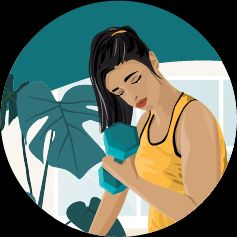Being honest with your doctor about all aspects of your condition — from sleepless nights to skipped meals — is essential for optimizing your care.
Ulcerative colitis (UC) is a type of inflammatory bowel disease. Research shows that around 1.25 million people in the United States have UC. This condition causes inflammation in your colon and rectum and ulcers in the lining of your intestine.
Your doctor plays a big role in your treatment plan, so it’s critical to have an open dialogue and mention your concerns during follow-up appointments. Each checkup is an opportunity to ask questions, discuss your daily routine, and speak up about how you’re feeling.
There’s
A UC diagnosis not only affects your physical health, but also your daily routine. If you have mild UC, you may experience fewer flare-ups and rarely interrupt your life. But it’s a different story if you have more moderate to severe UC, which is more likely to affect your daily routine.
Inability to attend work or school
Frequent diarrhea and abdominal pain can cause missed days from work or school. You may fall behind on classwork if you miss too many days from school, or lose pay if you miss too many days from work.
Difficulty sleeping
Frequent bowel activity and abdominal pain can keep you awake at night and make it difficult to fall asleep. Lack of sleep can raise your stress levels, which may worsen flare-ups and contribute to daytime tiredness.
Tendency to skip meals
If your symptoms get worse after eating, you may find yourself skipping meals to avoid a flare-up. Abdominal pain can also cause loss of appetite and weight loss.
Fear of public places
UC is an unpredictable condition. You may stray from public places or miss out on special events if you’re anxious about an attack.
Inability to exercise
Exercise may ease symptoms of UC and offer other health benefits. Regular activity can strengthen your immune system and boost your mood. But some exercises use your stomach muscles and put pressure on your gastrointestinal tract. This can trigger symptoms and worsen flare-ups.
Sexual problems
Although it’s possible to have a healthy, active sex life with UC, this condition can affect sexual intimacy.
Worries of incontinence or abdominal pain can reduce your interest in sex. Because UC can have a major physical impact on your body, you may also lose interest in sex due to fatigue or low energy. Chronic intestinal bleeding caused by UC increases the risk of anemia, which can contribute to low energy.
A strong relationship with your gastroenterologist is essential to your UC care. With proper treatment, UC can go into remission. Don’t be anxious about discussing your symptoms with your doctor or how UC interrupts your life. Your doctor can’t properly treat the illness until you explain how it’s really affecting you.
The severity of your UC symptoms can change over the years. Providing information about your daily routine and symptoms can help your doctor assess whether your current treatment plan is working or you need to switch to a different type of therapy.
Your doctor may prescribe various treatments to help manage symptoms and bring on remission, such as:
- over-the-counter antidiarrheal medication
- aminosalicylates
- corticosteroids
- immunosuppressants
- biologic drugs
- Janus kinase (JAK) inhibitors
When starting a new medication, you’ll follow up with your doctor after a few weeks to discuss your progress. If UC continues to affect your daily routine, you may be a candidate for biologics. This is a type of therapy that targets the proteins responsible for causing inflammation in your intestines.
In severe cases of UC, surgery may be necessary to remove your colon and rectum. Your doctor may recommend surgery if your UC isn’t responding to other treatment, or if you experience complications. Depending on the type of surgery, you may have an external bag attached to the outside of your abdomen to collect waste.
Although UC can be challenging at times, it’s possible to enjoy life to the fullest.
Finding the right treatment for UC can help you achieve and stay in remission. Be honest with your doctor and explain how UC affects your life. The more your doctor knows about your daily routine and health, the easier it’ll be to recommend a therapy that can provide long-term relief and help heal your colon.





